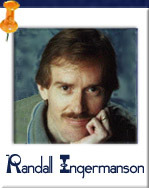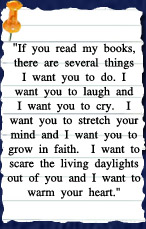


|
Focus on Fiction is pleased to feature Randall Ingermanson Randy is the multi-award winning author of several fiction titles, including the popular City of God series, as well as a non-fiction title, Who Wrote the Bible Code, and the world-famous Snowflake process for writers. When not creating a mind-bending work of literary genius, he can be found exercising his Ph.D. in theoretical physics at his other job- a high-tech computer imaging company in San Diego. Randy makes his home in the San Diego area, with his wife, Eunice, their three daughters, and Zephyr the cat.
|
|
Focus: Randy, thank you for joining us! Publication was a long time coming for you. Can you tell us a bit about your writing journey, and share a few life lessons you learned during your pre-published years? Randall Ingermanson: I decided in about 1984 that I was going to write a novel. I actually saw my first novel on the bookstore shelves in 2000. That was a very long wait, and one thing I learned was to be patient. The market was not ready for my kind of fiction in 1984, or even 1994. I think itís finally just about ready for me in 2004. I wish I could say that I waited very patiently, knowing that Godís timing would be perfect. But Iíd be lying if I said that. I spent the first several years doing research and then several more developing my craft. That got me up to about 1992. After that, I was convinced that the time to get published was right now! And it just wasnít. I was pretty mad at God for calling me to something and then not opening the doors. But there wasnít a lot I could do about it, so I continued doing more research and improving my level of craft and trying desperately to find some publisher interested in taking me on. Iím glad now that things didnít work out early on. In those years that I waited, I became a better writer. I would hate for my first novel to have gotten published. Not that it was awful, but . . . it was mediocre. When my first novel finally came out, it won a very nice award and got me some notoriety in the industry right away. Iím glad for that. Godís timing was the right timing. Focus: You are best known for your fascinating and quirky fiction stories, but your first contract was actually for a non-fiction book. What part of Who Wrote The Bible Code do you like best, or feel most strongly about? Randall Ingermanson: I wrote the book because I saw an opportunity. A number of people were making some very naÔve-sounding (but exciting) claims about the Bible. I realized that very few people had both the technical skills to rigorously investigate the Bible code and the writing skills to create a book on the subject. I was one of those people, so I jumped on it. My investigation convinced me that there was no real code in the Bible. Iím proud to say that nobody has ever found a technical error in my results. The Bible coders will argue with the interpretation of my results, but the work stands. More important than that, I wrote the book in an even-handed way that avoided calling people idiots. At the time, a lot of mud was getting flung by both sides. I threw no mud and treated the opposition with respect. Even the pro-codes people cite my book as one of the best on the subject, and I am on quite good terms with many of them. We just agree to disagree about the alleged codes. Focus: Since that first contract, how many books have you had published? Randall Ingermanson: Book number 7 (Double Vision) just came off the presses, and I recently turned in number 8 (Double Cross) to Zondervan. Focus: This year has been an extremely busy one for you! Retribution, the sequel to your breathtaking historical/time-travel story Premonition, hit the shelves in September. Double Vision, the brain-knotting romantic suspense you just mentioned, joins Retribution on the stands this month. Has it been challenging to manage editing and promotion for two very different books at the same time? Randall Ingermanson: Yes, itís been a very tough year. I still work a day job, though I am now down to 80% of full time. The two books came out only two months apart, which meant that Iíd just finish final edits on one and then have to do final edits on the next, and then on to galleys on the first, and then galleys on the next. And all the while, I was researching and writing the next book in the pipeline. Itís been like that all year, and at times I thought Iíd go crazy. My wife thought I might go sane. Iím not sure now that thereís a difference in our viewpoints. Focus: So letís talk a bit more about Premonition and Retribution. First off, can you give our readers a quick synopsis of each? Randall Ingermanson: Both books follow up on my first novel Transgression, which is now out of print. In Transgression, a rogue physicist went back in time to the year A.D. 57 to kill the apostle Paul. As you can guess, he failed, but he took along two folks from our centuryóRivka Meyers, a Messianic Jewish archaeology student, and Ari Kazan, an agnostic Israeli physicist. At the end of Transgression, Rivka and Ari find themselves stranded in the first century with no chance of return. They also find themselves hopelessly in love with each other. Premonition picks up a few months later, after Rivka and Ari have gotten married. And they have a lot of conflict. By this time, Ari has good reason to believe in God, but he is not at all persuaded that Jesus is the Messiah. Rivka loves him dearly, but Ari can be so infuriating! And they are just trying to get along in old Jerusalem. Rivka is a student of this time period and knows that James, brother of Jesus, will be executed in the year A.D. 62. She tries everything she can to prevent this disaster, but she has a hard time explaining where sheís getting her ďpremonitionsĒ from. So they donít believe her. Itís a story about Godís sovereignty and itís a story about forgiveness. For Ari, itís also a story about the Problem of Evil, a problem that has bugged plenty of theologians for centuries. Retribution continues the story after the execution of James. Rivka now knows that only four years remain before the beginning of the Jewish Revolt (in the year A.D. 66) and she wants desperately to get out of Jerusalem. But thereís a problem. Her husband Ari has become known throughout the city for his awesome engineering skills. (Physicists make great engineers.) Certain zealous young men want Ari to build them machines of war to oppose Rome. Should Ari help them in their hopeless quest, or should he not? The answer is not an easy one, and is the source of conflict with Rivka. There are two principles at work here. First, evil triumphs when good men fail to oppose evil. Second, sacrifice releases power. How do you resolve those two principles? Retribution is my favorite of all my novels because it has the deepest themes. Focus: Every so often, a good story provides an ďepiphany momentĒ-- a glimpse of something deep and life changing that you hadnít previously considered. Premonition and Retribution were so chock full of these moments I couldnít count them all! One major eye-opener was the picture you painted of New Testament Christians. Do you believe a better understanding of 1st century Jewish culture could enhance North American Christianity? Randall Ingermanson: Yes. Iíll admit I came to this understanding slowly. When I grew up in the Midwest, I knew almost nothing about Jews. I wasnít raised to consider them ďChrist-killers,Ē but I just didnít think about them at all and I didnít think they had much relevance to Christianity. As an adult, doing research for my novels, I began attending a Messianic Jewish synagogue. And I learned a whole lot of stuff that made the New Testament come alive in a way Iíd never imagined. My study of first century Judaism has explained a zillion things in the Bible that just didnít make sense before. And itís given me a new respect for our brothers and sisters, the Jews. Focus: Another part of Premonition and Retribution that fascinated me was Rivkaís perspective in the stories. What an amazing task it must have been to place yourself in the mind of a 21st century North American Jewish woman transported through time to 1st century Jerusalem! Did you consult your wife and daughters for help with Rivkaís ďgirl-speakĒ? Randall Ingermanson: Not directly. If thereís one thing I can do easily, itís listen to people and pick up on their speech and thought patterns. I have a lot of females in my life, and Iíve been spying on them for ages, trying to figure out how they think. And Iím still learning new things. Thatís what writers do, I guess. Focus: In Retribution, you talk about something called the MŲbius strip, a mathematical challenge faced by your lead character, Ari. In his case, the strip represented an impasse between peace and violence, but has that strip ever embodied a conflict in your own convictions or beliefs? Randall Ingermanson: The MŲbius strip is an odd mathematical object that appears to have two sides but actually has only one. It represents the ambiguities of life. Ambiguity is a major theme in all my writing. Itís a major theme in my life. When I listen to people arguing, I can often see both sides. Not that I think both are right, but sometimes both are right about different aspects of the problem. I see that a lot, and I wish we could all learn to listen to each other a little better. But Iím still learning to do that myself, as my wife will tell you! I would say that one of the main conflicts in my life has been the faith/science conflict. And the MŲbius strip serves as a metaphor for that conflict. Focus: Your trademark is that you write books about Ďlife at the intersection of Science Avenue and Faith Boulevardí. What is the most common crash you see at this intersection, and how do you hope your books will prevent these crashes? Randall Ingermanson: There are a lot of folks who will tell you that faith and science canít get along. The never-ending creation/evolution debate seems to be the main collision point. Because of this issue, a lot of scientists turn away from God, and a lot of Christians turn away from science. Thatís a shame on both counts. But hereís the thing. A fair number of scientists have the audacity to believe in God. I have a Ph.D. in physics and Iím a pretty conventional Christian. My buddy John Olson, who co-authored Oxygen and The Fifth Man with me, is a Ph.D. biochemist and a strong Christian. John and I have discussed the issues a lot, and we donít have the final answer on the creation/evolution thing. And yet . . . we believe there is an answer, even if we donít know it yet. Thatís a statement of faith both in God and in the science that God created for us to discover. In my books, I often have characters wrestling with some sort of faith/science issue. I donít show these characters neatly resolving their questions and living happily ever after with some cheap and easy answer. Instead, I show them living with their questions, dealing with ambiguity. Thatís faith. Faith in science. Faith in God. Itís possible to have both. I find both faith and science necessary. Even if I canít resolve all the conflicts. Focus: Your latest book, Double Vision, certainly addresses a few issues that both non-believers and believers face with Christianity. Can you tell us a little about your three main characters, Dillon, Keryn, and Rachel? Randall Ingermanson: This was a really fun book for me to write. Dillon is a fairly rigid Christian, a genius engineer, a guy whoís never had a girlfriend because heís been dealing all his life with Aspergerís Syndromeóa high-functioning form of autism. Now, with some counseling, heís coming out of his shell, and heís got two very nice ladies interested in him. And heís just a bit naÔve and clueless about how to deal with them. Keryn is a Christian novelist who works with Dillon. Sheís employed part time as Chief Financial Officer at the startup company where they both work. Keryn has a bit of a checkered past, but sheís a great lady for Dillon. Sheís a little frustrated that heís so dense, but at the same time, itís very nice to be dating a guy who doesnít have a long history with women. Rachel is the loose wire in this circuit. Sheís brilliant, sexy, exotic, flirtatious, and an agnostic. She was raised in a home with a Jewish father and a Christian mother and she is fed up with religion. Rachel has invented a quantum computing device that will be worth trillions of dollars if she and Dillon can bring it to market. They make a terrific team, but sparks soon start flying. Keryn has to mediate, and she really does not want Rachel and Dillon getting too close together. The problem is that Somebody Nasty wants Rachelís device. If Dillon and Keryn and Rachel canít get along, then they are toast. Itís a gnarly little love triangle, and I didnít know how it would turn out until the fourth draft. Focus: Dillon really is a fascinating character. What prompted you to write about a hero with Asperger's Syndrome? Randall Ingermanson: A friend who used to come to my church has Aspergerís Syndrome. He described it to me, and I thought it sounded fascinating. I did some research on it and realized that folks with Aspergerís are a very diverse and remarkable set of people. Itís been suggested that Einstein and Isaac Newton and Michelangelo had Aspergerís Syndrome. Itís possibleóall three had amazing powers of concentration. Autism is often made out to be weird and scary, but inside, weíre all just people. So I wanted to write a book that put my reader inside the skin of a character with Aspergerís and experience it all first hand. I hope I succeeded. Focus: Two other burning questions Iíve got to ask about Double Vision: First, can you confirm your cameo appearance in the book as a cat sitter? And for the record, do you use a Mac or a PC? Randall Ingermanson: Here are the facts: Keryn has a neighbor whoís a writer and stays up late working and is willing to go check on her cat at midnight when sheís afraid to go home. And that neighbor has a wife named Eunice and a cat named Zephyr. I write late at night, and my wife is named Eunice and my cat is named Zephyr. Itís an amazing coincidence, isnít it? As for the computers, I use a Mac at home and a PC at work. Iím fine with bothóitís that ambiguity theme playing in my life again. Focus: Now that youíve released Double Vision, whatís next on your writing horizon? What can we look forward to from the great pen of Randall Ingermanson in the coming year? Randall Ingermanson: Iíll soon be doing revisions on Double Cross, a novel Iím writing for Zondervan. I love this story. The premise is very simple: A con man falls in love with the wife of his intended victim. The book will be another romantic suspense novel with plenty of twists and turns and a fair bit of humor. Focus: Is there anything else you would like your readers to know? Randall Ingermanson: People are always trying to peg me and theyíre always missing. A lot of folks assume, since Iím a scientist, that I ďmustĒ write science fiction. Or, since Iím a guy, that I ďmustĒ write plot-oriented books. Or, since Iím a moderately intelligent guy, there can be no romance in my stories. Iím a little harder to pin down than that. Yeah, sure, the two books I did with John Olson were science fiction (thanks to John), but Iíve also done three historical novels, and Iíve now done a couple of contemporary novels. But my characters are always better than my plots. And I always throw in a love story or two. If you read my books, there are several things I want you to do. I want you to laugh and I want you to cry. I want you to stretch your mind and I want you to grow in faith. I want to scare the living daylights out of you and I want to warm your heart. The only reason I have any hope that all these things will happen as you read, is because they all happen to me when Iím writing the story.
|











© Focus on Fiction, 2003-2005 All Rights Reserved. Site maintained by PulsePoint Design. Direct questions or comments here
| Home | Upcoming Author Interviews | Past Author Interviews | Christian Fiction Reviews | About Us | | FAQís | Contact Us | Links |